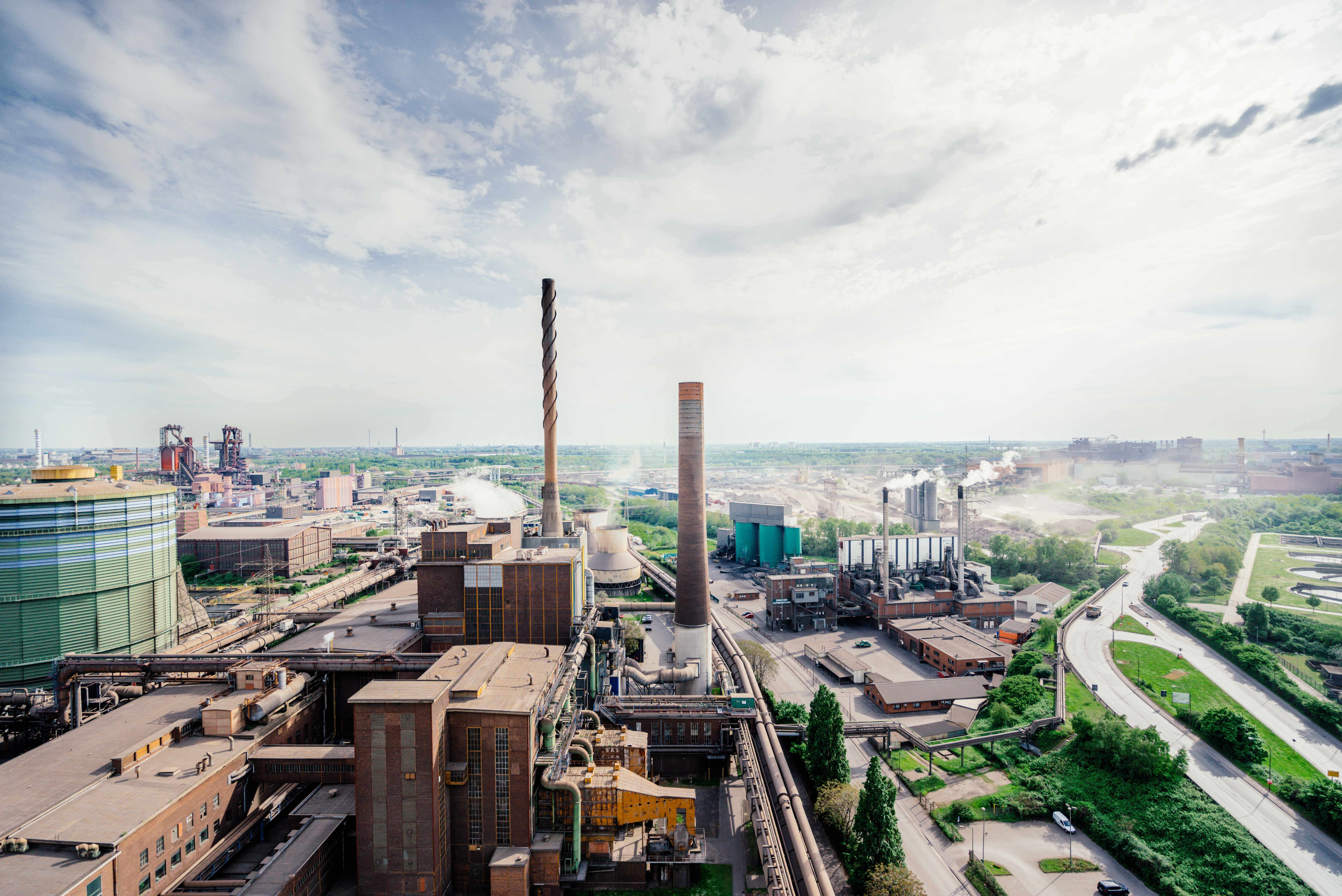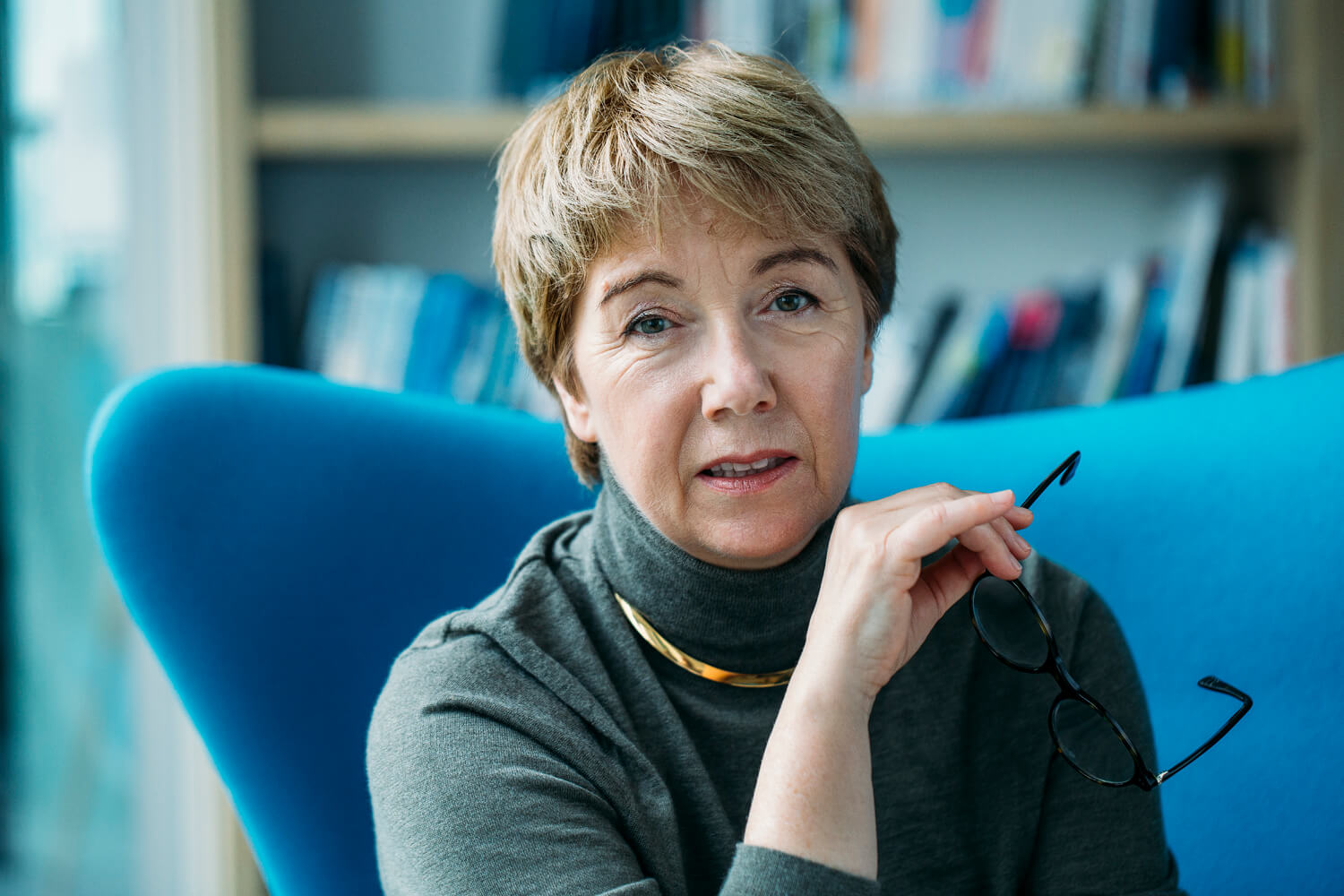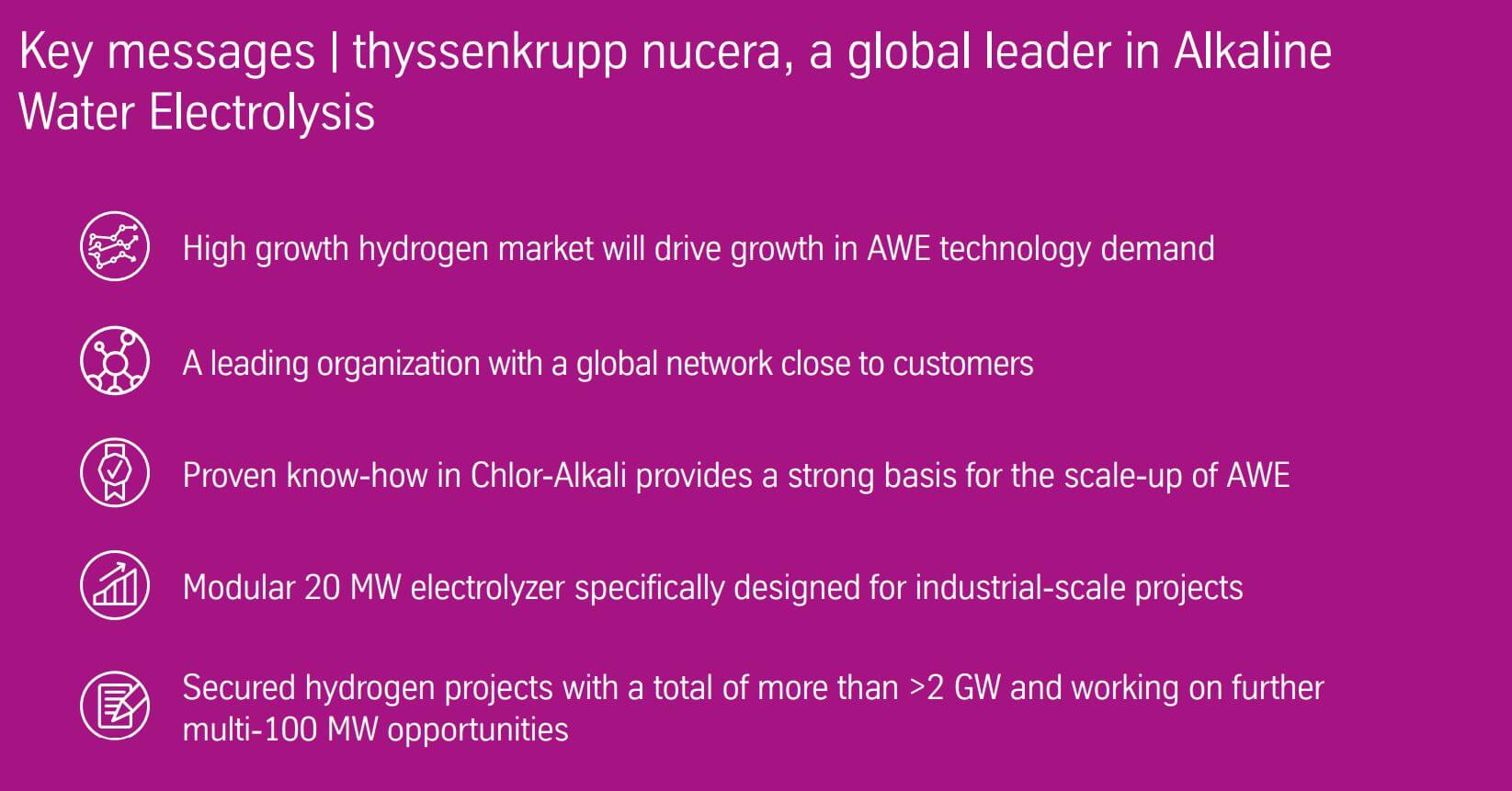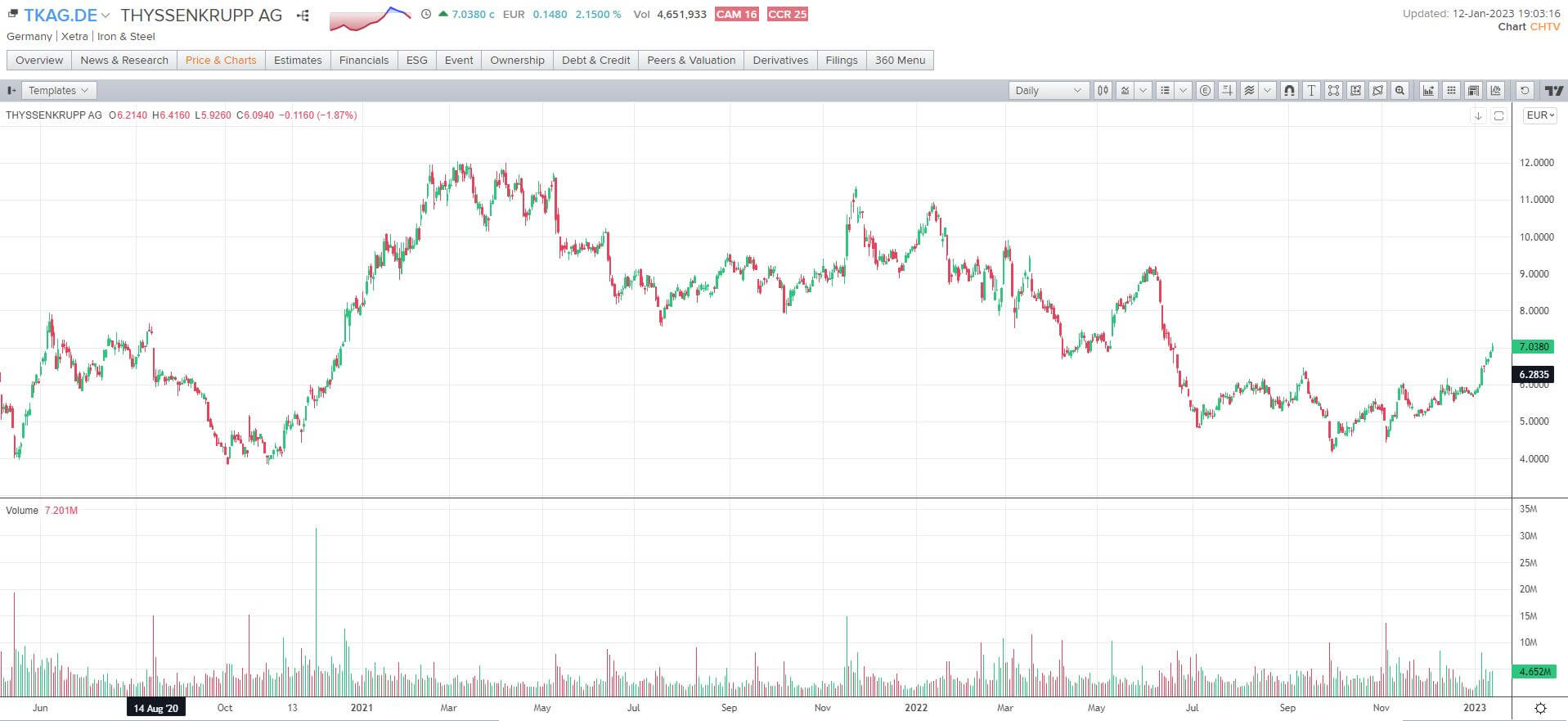Climate change with hydrogen: Energy carrier of the future
The need for renewable energy sources has never been greater. Our society needs a sustainable system to replace fossil fuels with their CO2 emissions in the long term. With the National Hydrogen Strategy, Germany is creating a uniform framework for action for the future production, transport, use and further use of hydrogen and, thus, for corresponding innovations and investments. Hydrogen is considered the key element to replace fossil fuels long-term.
The most abundant chemical element in the universe is clean and readily available. Produced using renewable energies, so-called green hydrogen, as a potentially CO2-free raw material, is gaining importance worldwide. Whether as a raw material for industry, as a fuel for fuel cells or as a synthetic energy carrier - the potential applications are diverse: the global business initiative Hydrogen Council, for example, estimates that the share of climate-neutral produced hydrogen in final energy demand will rise from the current 2% to 18% in 2025. Europe is to become climate-neutral by 2050 and save at least 55% of greenhouse gases by 2030 compared with 1990. The "Fit for 55" package has further tightened EU legislation.

Evolution to engineering "Made in Germany" completed
Anyone who refers to thyssenkrupp AG today as a steel company is only talking about around 25% of the Group's output. That is because, in its current setup, thyssenkrupp more closely resembles a technology holding company. As part of the still ongoing reorganization process, the Group's organizational structure was divided into six business segments in October 2020: Materials Services, Industrial Components, Automotive Technology, Steel Europe, Marine Systems, and Multi Tracks - a new stand-alone segment combining businesses for which thyssenkrupp is considering other ownership structures in the short to medium term.
Marine Systems and the large-diameter bearings (Bearings) and forging businesses (Forged Technologies) combined in the Industrial Components segment are managed directly by thyssenkrupp AG as business units. thyssenkrupp brings together viable products and services under its strong umbrella brand, which make an important contribution to a better, more livable and sustainable future. In a broad ESG approach, the Company promises to work with its customers to develop new technologies and innovations as well as resource-saving solutions to meet future challenges. The aim is to enable the efficient use of resources and produce consumer and industrial goods in a more environmentally friendly way.
Overview of the fiscal year 2021/2022
In a challenging market environment, thyssenkrupp held up well in fiscal 2021/2022 and achieved or exceeded all its most recently issued financial targets. Despite the war in Ukraine and the continuing disruptions caused by the Corona pandemic and disruptions in global supply chains, the Group's businesses recorded order intakes totalling EUR 44.3 billion. That represents an increase of 12% compared to the previous year. Sales improved by 21% to EUR 41.1 billion, while adjusted EBIT almost tripled to EUR 2.1 billion (previous year: 796 million). This positive development was driven, among other things, by the measures introduced to improve the performance of the businesses and the temporarily significant in the Materials Services and Steel Europe markets, which resulted in higher revenues and improved margins.

Martina Merz, CEO of the thyssenkrupp Group: "The figures show: We have made good progress with the reorganization of thyssenkrupp and significantly improved the operating performance of the businesses. We have built up resilience and substance and are now better able to respond appropriately and accurately to crises in the businesses. Although our momentum in the change process was slowed, we were able to withstand three external shocks - the pandemic, the semiconductor shortage and the war - comparatively robustly. We expect the intensity of competition to continue to increase on a sustained basis in the current environment. Performance and productivity will therefore remain our top priorities. And that is why we must resolutely continue on our chosen path of transformation and the best possible further development of our businesses."
Challenges, outlook, assessment
Current economic conditions, including ongoing armed conflicts, provide a great deal of uncertainty and lead to a limited ability to plan reliably, particularly in cyclical business areas. Although the situation in supply chains has recently eased again, raw material costs remain subject to high volatility. This is driving up the cost of material procurement.
The current market environment is characterized by the ongoing energy crisis as well as high inflation and rising interest rates. Assuming that required fossil fuels and other raw materials remain available and business is not impacted by new lockdown measures, thyssenkrupp expects a slight decrease in sales in fiscal 2022/2023 (prior year: €41.1 billion) due to restructuring measures. This is mainly due to effects from the normalization of prices at Materials Services and Steel Europe and from the completed disposals in the Multi Tracks segment. For adjusted EBIT, thyssenkrupp expects a decrease to a figure in the mid to high three-digit million euro range (prior year: €2.1 billion). This is due in particular to the absence of the dynamic price effects which strongly supported the prior year at Materials Services and also Steel Europe, where higher factor costs are also having an impact. The next report for the first quarter will be published on February 14, 2023.
Hydrogen as a key technology for climate change
CFO Klaus Keysberg knows what he is talking about when it comes to today's challenges for industry. The thyssenkrupp Group emitted 23 million tons of CO2 in 2019. That is almost 3% of all German greenhouse gas emissions. But those who emit a lot can also make a big difference. That is why the Duisburg-based technology group is committed to the Paris climate protection agreement of 2015: by 2030, it aims to reduce its home-grown emissions by 30% and by 2050, it wants to be completely climate neutral.
"For thyssenkrupp, hydrogen is the key technology for making our industry fit for the future and sustainable."
In the context of green technologies, hydrogen has so far been seen as the beacon of hope for a sustainable industry. Yet another molecule could become even more important than H2 in the short and medium term for achieving the energy transition. We are talking about NH3, ammonia, the secret star for CO2-free energy production. Today, about 80% of the 170 million tons of ammonia produced annually worldwide is used as a base chemical for fertilizers. Only 20% is used for other technical solutions. In the coming years, however, demand for ammonia will shift dramatically toward new markets: power generation and transportation. That is because ammonia is the most cost-effective liquid energy source for long-term storage, easy to ship globally, and a viable marine fuel. In order to meet these future requirements and different markets, thyssenkrupp has already developed fully standardized and modularized green ammonia plant concepts. In combination with water electrolysis, these plants can even produce CO2-free "green ammonia". The potential of hydrogen plays an important role at thyssenkrupp, which is in the unusual situation of being both a consumer and producer of green hydrogen. thyssenkrupp uses its core expertise in alkaline water electrolysis and has been developing climate-neutral supply concepts for industrial applications for years. The business area has already realized a total of 10 gigawatts of installed capacity for the chemical industry. In parallel, it is working at full speed on developing climate-neutral steel production.
On course for growth with H2 subsidiary nucera
An already much-discussed approach is the use of green-generated electricity to produce hydrogen. Current research areas are in stationary energy generation and the development of H2 drives for vehicles in continuous use, such as in the transportation and logistics sector. thyssenkrupp AG is already making good progress in the US with its H2 subsidiary nucera. Here it supplies engineering services for the alkaline production of hydrogen to various Air Products sites for the mobility market in California. In the past fiscal year, global order intake increased from EUR 377 million to EUR 1.34 billion, and sales rose from EUR 319 million to EUR 383 million. Around EUR 1 billion of the order volume relates to the "Alkaline Water Electrolysis" (AWE) business. It is seen as the main driver of industrial decarbonization because it can be operated on an industrial scale.

The focus on greater sustainability is an integral part of thyssenkrupp's strategy. thyssenkrupp nucera is a global leader in green hydrogen. With its technology, the Company supports its customers on the way to climate neutrality and a decarbonized industry. With over 5 decades of project experience, more than 600 completed projects, 240,000 electrolysis cells produced and over 10 gigawatts of installed electrolysis capacity, the Company is a market leader in the chlor-alkali business. Alkaline water electrolysis, which enables large-scale green hydrogen production, is founded on this strong expertise. Through a standardized, modular approach, large volumes of hydrogen can now be produced at low cost. thyssenkrupp nucera is one of the European pioneers in this technology.
Interim Summary: The turnaround is within reach
Unfortunately, the Duisburg-based company had to postpone the planned stock market flotation of nucera indefinitely in 2022, meaning the subsidiary lacks important growth capital, which now has to be provided via the holding company. However, thanks to the improved Group figures in 2021/22, the Company can now look positively to the future again. In 2022 thyssenkrupp shares slipped sharply by 48% as the market priced in corresponding risks on the energy and raw materials side with discounts. These negative factors are currently easing significantly, giving the Group breathing room. Optimism is again warranted for 2023 and 2024, as the order situation is currently quite convincing due to increasing public budgets for the fight against climate change. With total sales of over EUR 34 billion, pre-tax profits of EUR 650 to 950 million should be possible again in the medium term. Currently, the MDAX stock is valued at a market capitalization of only EUR 4.2 billion.

The consensus of the 14 analysts polled by Refinitiv Eikon is moderately positive on thyssenkrupp AG. Of 14 mentions, 11 are in the "buy/overweight/neutral" range with an average price target of EUR 8.49, and only 3 advise "underweight/sell". From a chart perspective, the price should no longer fall below EUR 6.25 to underpin the positive turnaround of recent weeks. The risk profile of thyssenkrupp shares is suitable for long-term investors.

